+ Filter
 Loading...
Loading...

EGFR & CD3
Engineered Antibody Products
Antibody-like Scaffold Protein Products
Glyco-Engineering Antibody Products
Tetramer Products
Antibody Magnetic Beads
Cancer Stem Cell Biomarker Specific Antibody Products
AbPlus
Recombinant Antibody Products
Functional Antibody Products
Formats
Research Area
Anti-EGFR & CD3 Recombinant Antibody Products
-
- Derivation: Human
- Species Reactivity: Human
- Type: IgG
- Application: WB, ELISA, FuncS, IB, FC, SPR, Apop
-
- Derivation: Humanized (from mouse)
- Species Reactivity: Human
- Type: IgG1 - kappa
- Application: ELISA, IP, FC, FuncS, Neut, IF, IHC
-
- Derivation: Human
- Species Reactivity: Human
- Type: IgG2 - kappa
- Application: ELISA, IP, FC, FuncS, Neut, IF, ICC
- Anti-Human EGFR Recombinant Antibody (TAB-014MZ-VHH) (TAB-014MZ-VHH)
-
- Type: Single domain antibody
- Recombinant Human Anti-EGFR Antibody scFv Fragment (PABX-053-S (P)) (PABX-053-S (P))
-
- Derivation: Human
- Species Reactivity: Human
- Type: scFv
- Application: WB, ELISA, FuncS
- Recombinant Human Anti-EGFR Antibody scFv Fragment (PABX-052-S (P)) (PABX-052-S (P))
-
- Derivation: Human
- Species Reactivity: Human
- Type: scFv
- Application: WB, ELISA, FuncS
- Recombinant Human Anti-EGFR Antibody Fab Fragment (PABX-053-F (E)) (PABX-053-F (E))
-
- Derivation: Human
- Species Reactivity: Human
- Type: Fab
- Application: WB, ELISA, FuncS
- Anti-Human EGFR Recombinant Antibody Fab Fragment (DX 1-10) (TAB-323MZ-F(E))
-
- Type: Human antibody
- Application: SPR
- Anti-Human EGFR Recombinant Antibody Fab Fragment (DX 1-6) (TAB-322MZ-F(E))
-
- Type: Human antibody
- Application: SPR
- Anti-Human EGFR Recombinant Antibody Fab Fragment (DX 1-4) (TAB-321MZ-F(E))
-
- Type: Human antibody
- Application: SPR
- Anti-Human EGFR Recombinant Antibody Fab Fragment (EG-26-11) (TAB-314MZ-F(E))
-
- Derivation: Library
- Type: Human antibody
- Application: ELISA, FC
- Anti-Human EGFR Recombinant Antibody Fab Fragment (EG-19-11) (TAB-313MZ-F(E))
-
- Derivation: Library
- Type: Human antibody
- Application: ELISA, FC
- Anti-Human EGFR Recombinant Antibody Fab Fragment (528) (TAB-315MZ-F(E))
-
- Type: Human antibody
- Application: WB, FC
-
- Derivation: Human
- Species Reactivity: Human
- Type: IgG
- Application: WB, ELISA, FuncS
- Anti-Human EGFR Recombinant Antibody Fab Fragment (pSEX81-63) (TAB-325MZ-F(E))
-
- Derivation: Phage display library
- Type: Human antibody
- Application: IP, ELISA, FC
- Anti-Human EGFR Recombinant Antibody Fab Fragment (pSEX81-6) (TAB-324MZ-F(E))
-
- Derivation: Phage display library
- Type: Human antibody
- Application: IP, ELISA, FC
- Human Anti-EGFR Recombinant Antibody; Fab Fragment (TAB-296MZ-F(E)) (TAB-296MZ-F(E))
-
- Species Reactivity: Human
- Type: Human Fab
- Application: In vitro binding assay
- Human Anti-EGFR Recombinant Antibody; Fab Fragment (TAB-295MZ-F(E)) (TAB-295MZ-F(E))
-
- Species Reactivity: Human
- Type: Human Fab
- Application: In vitro binding assay
- Human Anti-EGFR Recombinant Antibody; Fab Fragment (TAB-294MZ-F(E)) (TAB-294MZ-F(E))
-
- Species Reactivity: Human
- Type: Human Fab
- Application: In vitro binding assay
- Human Anti-EGFR Recombinant Antibody; Fab Fragment (TAB-293MZ-F(E)) (TAB-293MZ-F(E))
-
- Species Reactivity: Human
- Type: Human Fab
- Application: In vitro binding assay
- Human Anti-EGFR Recombinant Antibody; Fab Fragment (TAB-292MZ-F(E)) (TAB-292MZ-F(E))
-
- Species Reactivity: Human
- Type: Human Fab
- Application: In vitro binding assay
- Human Anti-EGFR Recombinant Antibody; Fab Fragment (TAB-291MZ-F(E)) (TAB-291MZ-F(E))
-
- Species Reactivity: Human
- Type: Human Fab
- Application: FC
- Human Anti-EGFR Recombinant Antibody; Fab Fragment (TAB-299MZ-F(E)) (TAB-299MZ-F(E))
-
- Species Reactivity: Human
- Type: Human Fab
- Application: Internalization Assay
- Human Anti-EGFR Recombinant Antibody; Fab Fragment (TAB-279MZ-F(E)) (TAB-279MZ-F(E))
-
- Species Reactivity: Human
- Type: Human Fab
- Application: ELISA, WB
- Human Anti-EGFR Recombinant Antibody; Fab Fragment (TAB-278MZ-F(E)) (TAB-278MZ-F(E))
-
- Species Reactivity: Human
- Type: Human Fab
- Application: ELISA, WB
- Human Anti-EGFR Recombinant Antibody; Fab Fragment (TAB-290MZ-F(E)) (TAB-290MZ-F(E))
-
- Species Reactivity: Human
- Type: Human Fab
- Application: FC
- Human Anti-EGFR Recombinant Antibody (TAB-289MZ-F(E)); Fab Fragment (TAB-289MZ-F(E))
-
- Species Reactivity: Human
- Type: Human Fab
- Application: ADCC assay
- Human Anti-EGFR Recombinant Antibody (TAB-288MZ-F(E)); Fab Fragment (TAB-288MZ-F(E))
-
- Species Reactivity: Human
- Type: Human Fab
- Application: ADCC assay
- Human Anti-EGFR Recombinant Antibody (TAB-287MZ-F(E)); Fab Fragment (TAB-287MZ-F(E))
-
- Species Reactivity: Human
- Type: Human Fab
- Application: ADCC assay
- Human Anti-EGFR Recombinant Antibody; Fab Fragment (TAB-284MZ-F(E)) (TAB-284MZ-F(E))
-
- Species Reactivity: Human
- Type: Human Fab
- Application: ELISA
- Human Anti-EGFR Recombinant Antibody; Fab Fragment (TAB-283MZ-F(E)) (TAB-283MZ-F(E))
-
- Species Reactivity: Human
- Type: Human Fab
- Application: ELISA
- Human Anti-EGFR Recombinant Antibody; Fab Fragment (TAB-282MZ-F(E)) (TAB-282MZ-F(E))
-
- Species Reactivity: Human
- Type: Human Fab
- Application: ELISA
- Human Anti-EGFR Recombinant Antibody; Fab Fragment (TAB-274MZ-F(E)) (TAB-274MZ-F(E))
-
- Species Reactivity: Human
- Type: Humanized Fab
- Application: FC
- Human Anti-EGFR Recombinant Antibody; Fab Fragment (TAB-300MZ-F(E)) (TAB-300MZ-F(E))
-
- Species Reactivity: Human
- Type: Humanized Fab
- Application: ELISA
- Anti-Human EGFR Recombinant Antibody Fab Fragment (L4-H3) (TAB-309MZ-F(E))
-
- Type: Humanized antibody
- Anti-Human EGFR Recombinant Antibody Fab Fragment (Hu225) (TAB-298MZ-F(E))
-
- Type: Humanized antibody
- Application: ELISA, WB
- Anti-Human EGFR Recombinant Antibody Fab Fragment (H225) (TAB-297MZ-F(E))
-
- Type: Humanized antibody
- Application: ELISA, WB
- Recombinant Mouse Anti-EGFR Antibody scFv Fragment (Matuzumab) (PABX-051-S (P))
-
- Derivation: Human
- Species Reactivity: Human
- Type: scFv
- Application: WB, Neut, FuncS
-
- Derivation: Humanized
- Species Reactivity: Human
- Type: IgG1
- Application: Neut, ELISA, IF, IP, FuncS, FC, ICC
- Recombinant Human Anti-EGFR Antibody Fab Fragment (PABX-052-F (E)) (PABX-052-F (E))
-
- Derivation: Human
- Species Reactivity: Human
- Type: Fab
- Application: WB, ELISA, FuncS
- Anti-Human EGFR Recombinant Antibody (TAB-464CQ) (TAB-464CQ)
-
- Derivation: Chimeric
- Species Reactivity: Human
- Type: IgG1, κ
- Application: ELISA, IHC, FC, IP, IF, FuncS
- Recombinant Mouse Anti-EGFR Antibody Fab Fragment (Matuzumab) (PABX-051-F (E))
-
- Derivation: Human
- Species Reactivity: Human
- Type: Fab
- Application: WB, Neut, FuncS
-
- Derivation: Chimeric (human/mouse)
- Species Reactivity: Human
- Type: IgG1 - kappa
- Application: IF, WB, Inhib
-
- Derivation: Human
- Species Reactivity: Human
- Type: IgG
- Application: WB, Neut, FuncS, FC, ELISA, IF, Inhib
- Human Anti-EGFR Recombinant Antibody; Fab Fragment (TAB-308MZ-F(E)) (TAB-308MZ-F(E))
-
- Species Reactivity: Human
- Type: Chimeric antibody (mouse/human)
- Application: ELISA, FC
- Human Anti-EGFR Recombinant Antibody; Fab Fragment (TAB-302MZ-F(E)) (TAB-302MZ-F(E))
-
- Species Reactivity: Human
- Type: Chimeric (mouse/human) Fab
- Application: ELISA
-
- Derivation: Chimeric (Human/Mouse)
- Species Reactivity: Human
- Type: IgG1 - kappa
- Application: Neut, ELISA, IF, IP, FuncS, FC, WB
- Human Anti-EGFR Recombinant Antibody; Fab Fragment (TAB-272MZ-F(E)) (TAB-272MZ-F(E))
-
- Species Reactivity: Human
- Type: Chimeric (mouse/human) Fab
- Application: FuncS
- Anti-Human EGFR Recombinant Antibody Fab Fragment (LA1) (TAB-276MZ-F(E))
-
- Application: MTT assay
- Mouse Anti-EGFR Recombinant Antibody; Fab Fragment (TAB-275MZ-F(E)) (TAB-275MZ-F(E))
-
- Species Reactivity: Human
- Type: Mouse Fab
- Application: FC
- Mouse Anti-EGFR Recombinant Antibody; Fab Fragment (TAB-273MZ-F(E)) (TAB-273MZ-F(E))
-
- Species Reactivity: Human
- Type: Mouse Fab
- Application: FC
- Mouse Anti-EGFR Recombinant Antibody; Fab Fragment (TAB-281MZ-F(E)) (TAB-281MZ-F(E))
-
- Species Reactivity: Human
- Type: Mouse Fab
- Application: WB, IF, IHC
- Mouse Anti-EGFR Recombinant Antibody; Fab Fragment (TAB-326MZ-F(E)) (TAB-326MZ-F(E))
-
- Species Reactivity: Human
- Type: Mouse Fab
- Application: FC
- Mouse Anti-EGFR Recombinant Antibody; Fab Fragment (TAB-286MZ-F(E)) (TAB-286MZ-F(E))
-
- Species Reactivity: Human
- Type: Mouse Fab
- Application: FC
- Mouse Anti-EGFR Recombinant Antibody; Fab Fragment (TAB-285MZ-F(E)) (TAB-285MZ-F(E))
-
- Species Reactivity: Human
- Type: Mouse Fab
- Application: FC
- Mouse Anti-EGFR Recombinant Antibody; Fab Fragment (TAB-301MZ-F(E)) (TAB-301MZ-F(E))
-
- Species Reactivity: Human
- Type: Mouse Fab
- Application: ELISA
- Mouse Anti-EGFR Recombinant Antibody; Fab Fragment (TAB-307MZ-F(E)) (TAB-307MZ-F(E))
-
- Species Reactivity: Human
- Type: Mouse Fab
- Application: ELISA, FC
- Mouse Anti-EGFR Recombinant Antibody; Fab Fragment (TAB-306MZ-F(E)) (TAB-306MZ-F(E))
-
- Species Reactivity: Human
- Type: Mouse Fab
- Application: ELISA
- Mouse Anti-EGFR Recombinant Antibody; Fab Fragment (TAB-305MZ-F(E)) (TAB-305MZ-F(E))
-
- Species Reactivity: Human
- Type: Mouse Fab
- Application: ELISA
- Mouse Anti-EGFR Recombinant Antibody; Fab Fragment (TAB-304MZ-F(E)) (TAB-304MZ-F(E))
-
- Species Reactivity: Human
- Type: Mouse Fab
- Application: ELISA
- Mouse Anti-EGFR Recombinant Antibody; Fab Fragment (TAB-303MZ-F(E)) (TAB-303MZ-F(E))
-
- Species Reactivity: Human
- Type: Mouse Fab
- Application: ELISA
- Mouse Anti-EGFR Recombinant Antibody; Fab Fragment (TAB-312MZ-F(E)) (TAB-312MZ-F(E))
-
- Species Reactivity: Human, Monkey
- Type: Mouse Fab
- Application: ELISA
- Mouse Anti-EGFR Recombinant Antibody; Fab Fragment (TAB-311MZ-F(E)) (TAB-311MZ-F(E))
-
- Species Reactivity: Human
- Type: Mouse Fab
- Application: ELISA
- Mouse Anti-EGFR Recombinant Antibody; Fab Fragment (TAB-310MZ-F(E)) (TAB-310MZ-F(E))
-
- Species Reactivity: Human, Monkey
- Type: Mouse Fab
- Application: ELISA
- Anti-Human EGFR Recombinant Antibody Fab Fragment (12D03) (TAB-317MZ-F(E))
-
- Application: WB, MTT assay
- Anti-Human EGFR Recombinant Antibody Fab Fragment (07D06) (TAB-316MZ-F(E))
-
- Application: WB, MTT assay
- Anti-Human EGFR Recombinant Antibody (TAB-016MZ-VHH) (TAB-016MZ-VHH)
-
- Type: Single domain antibody
- Application: sELISA
- Anti-Human EGFR Recombinant Antibody (TAB-015MZ-VHH) (TAB-015MZ-VHH)
-
- Type: Single domain antibody
- Application: sELISA
-
- Derivation: Phage display library
- Species Reactivity: Human
- Type: Camelid Penta-VHH
- Application: ELISA, In vivo staining
- Camelid Anti-EGFR Recombinant Single Domain Antibody (HPAB-0705-YJ-VHH) (HPAB-0705-YJ-VHH)
-
- Derivation: Phage display library
- Species Reactivity: Human
- Type: Camelid VHH
- Application: ELISA, In vivo staining
-
- Species Reactivity: Human
- Type: Camelid VHH
- Application: ELISA
-
- Species Reactivity: Mouse
- Type: Llama VHH
- Application: ELISA, IHC, FC, FuncS
-
- Species Reactivity: Human
- Type: Llama VHH
- Application: ELISA
-
- Species Reactivity: Human
- Type: Llama VHH
- Application: ELISA
-
- Species Reactivity: Human
- Type: Llama VHH
- Application: ELISA
-
- Species Reactivity: Human
- Type: Llama VHH
- Application: ELISA
-
- Species Reactivity: Human
- Type: Llama VHH
- Application: ELISA
-
- Species Reactivity: Human
- Type: Llama VHH
- Application: ELISA, FC, IP, FuncS
-
- Species Reactivity: Human
- Type: Llama VHH
- Application: ELISA
-
- Species Reactivity: Human
- Type: Llama VHH
- Application: ELISA
-
- Species Reactivity: Human
- Type: Llama VHH
- Application: ELISA
-
- Species Reactivity: Human
- Type: Llama VHH
- Application: ELISA
-
- Species Reactivity: Human
- Type: Llama VHH
- Application: ELISA
-
- Species Reactivity: Human
- Type: Llama VHH
- Application: ELISA
-
- Species Reactivity: Human
- Type: Camelid VHH
- Application: ELISA
-
- Species Reactivity: Human
- Type: Camelid VHH
- Application: ELISA
- Recombinant Camelid Anti-EGFR Single Domain Antibody (HPAB-1027WJ)
-
- Species Reactivity: Human
- Type: Camelid VHH
- Application: ELISA, WB
-
- Species Reactivity: Human
- Type: Llama VHH
- Application: ELISA
-
- Species Reactivity: Human
- Type: Llama VHH
- Application: ELISA
-
- Species Reactivity: Human
- Type: Llama VHH
- Application: ELISA
- Mouse Anti-NHP EGFR Recombinant Antibody (clone 225) (VS-1024-XY177)
-
- Species Reactivity: Human, Non-human primate
- Type: Mouse IgG1
- Application: IF, IP
-
- Species Reactivity: Human
- Type: Rabbit IgG
- Application: WB, IF, ICC, FC
-
- Species Reactivity: Human
- Type: Rabbit IgG
- Application: WB, IF, ICC, FC
-
- Species Reactivity: Human
- Type: Rabbit IgG
- Application: WB, IF, ICC, FC
-
- Species Reactivity: Human
- Type: Rabbit IgG
- Application: ELISA
-
- Species Reactivity: Human
- Type: Rabbit IgG
- Application: IF, ICC, FC
- Rabbit Anti-EGFR Recombinant Antibody (clone AFY0004) (MOR-0033-FY)
-
- Species Reactivity: Human, Mouse
- Type: Rabbit IgG
- Application: ICC, IHC, WB
-
- Derivation: Phage display library
- Species Reactivity: Human
- Type: Rabbit IgG
- Application: IHC-P
- Chicken Anti-EGFR Polyclonal IgY (BRD-0668MZ)
-
- Species Reactivity: Human
- Type: Chicken antibody
- Application: WB
- Chicken Anti-EGFR Polyclonal IgY (BRD-0183MZ)
-
- Species Reactivity: Human, Mouse, Rat
- Type: Chicken antibody
- Application: WB
More Infomation
Can't find the products you're looking for? Try to filter in the left sidebar.Filter By Tag
More Infomation
Our customer service representatives are available 24 hours a day, from Monday to Sunday. Contact Us
For Research Use Only. Not For Clinical Use.
EGFR encodes a receptor tyrosine kinase that is involved in the regulation of cell growth, survival, and differentiation. It is activated by binding to its ligands, such as epidermal growth factor (EGF), and mediates downstream signaling pathways that control cellular processes like proliferation, migration, and differentiation. EGFR is critical in normal development, wound healing, and tissue repair. However, mutations or overexpression of EGFR are associated with various cancers, including non-small cell lung cancer (NSCLC), making EGFR a target for cancer therapies, including monoclonal antibodies and tyrosine kinase inhibitors.

The protein encoded by this gene is part of the T-cell receptor/CD3 complex (TCR/CD3 complex) and is involved in T-cell development and signal transduction. The encoded membrane protein represents the delta subunit of the CD3 complex, and along with four other CD3 subunits, binds either TCR alpha/beta or TCR gamma/delta to form the TCR/CD3 complex on the surface of T-cells. Defects in this gene are a cause of severe combined immunodeficiency autosomal recessive T-cell-negative/B-cell-positive/NK-cell-positive (SCIDBNK). Two transcript variants encoding different isoforms have been found for this gene. Other variants may also exist, but the full-length natures of their transcripts has yet to be defined.

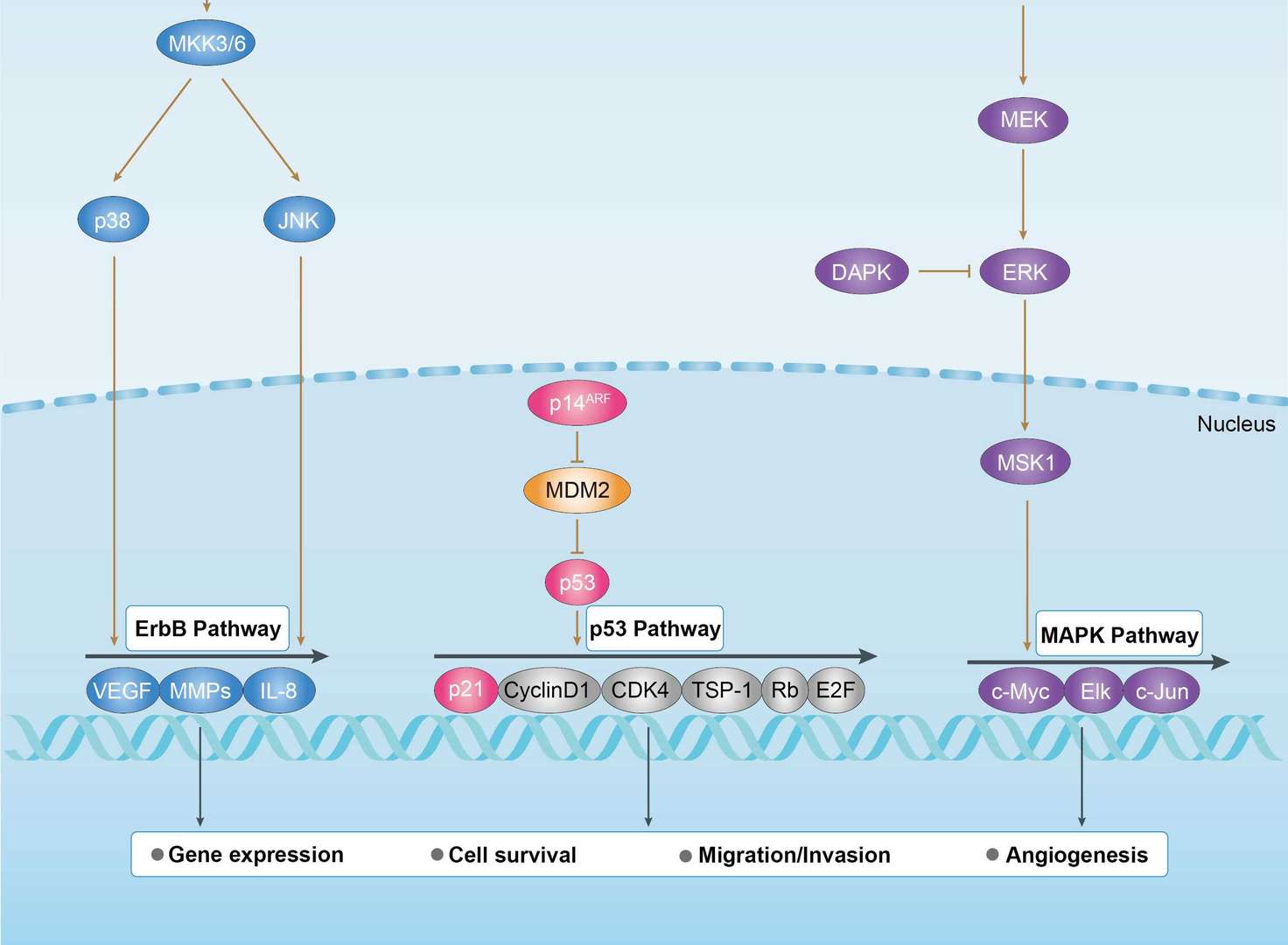 Bladder Cancer
Bladder Cancer
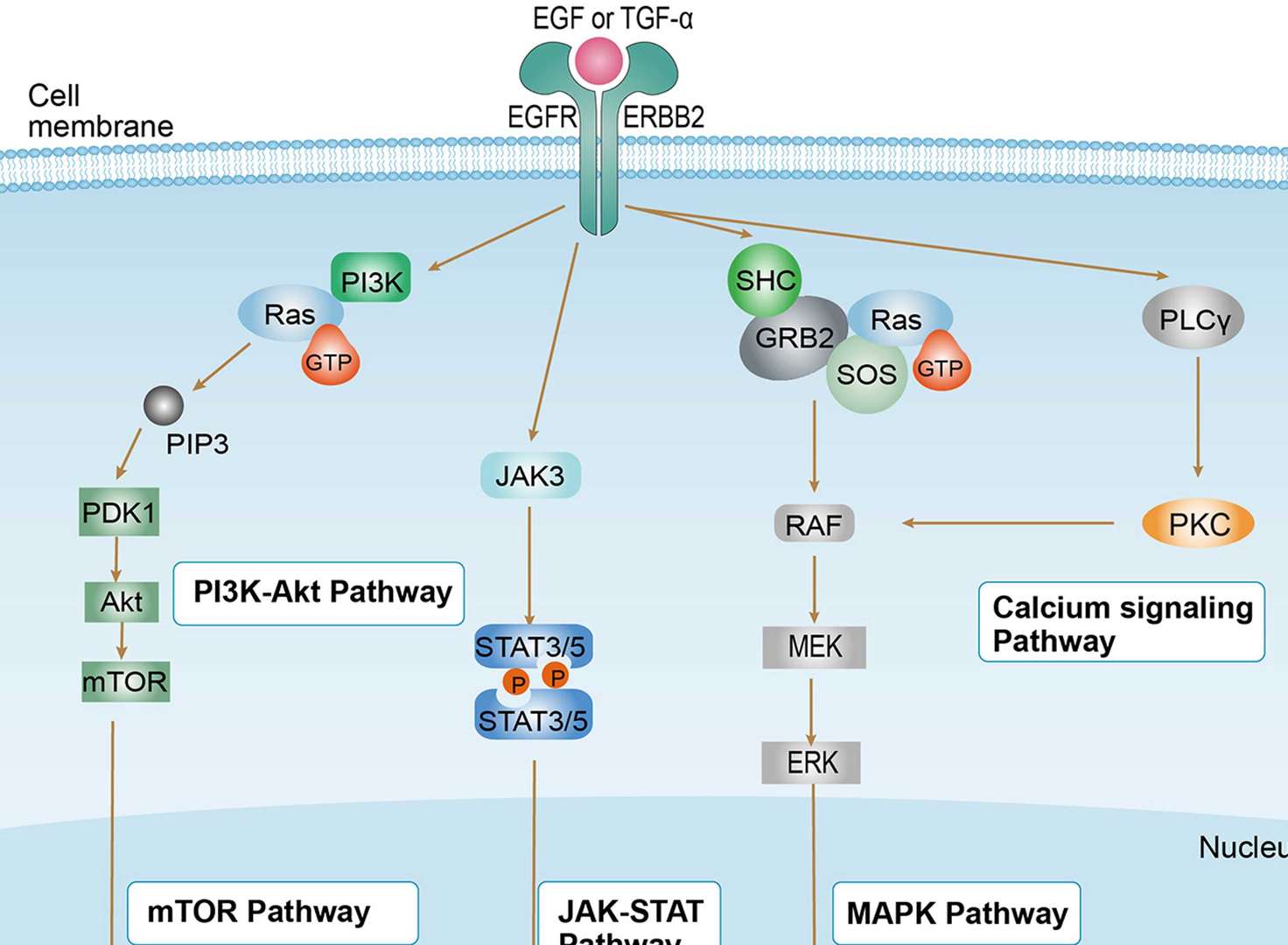 Non-small Cell Lung Cancer
Non-small Cell Lung Cancer
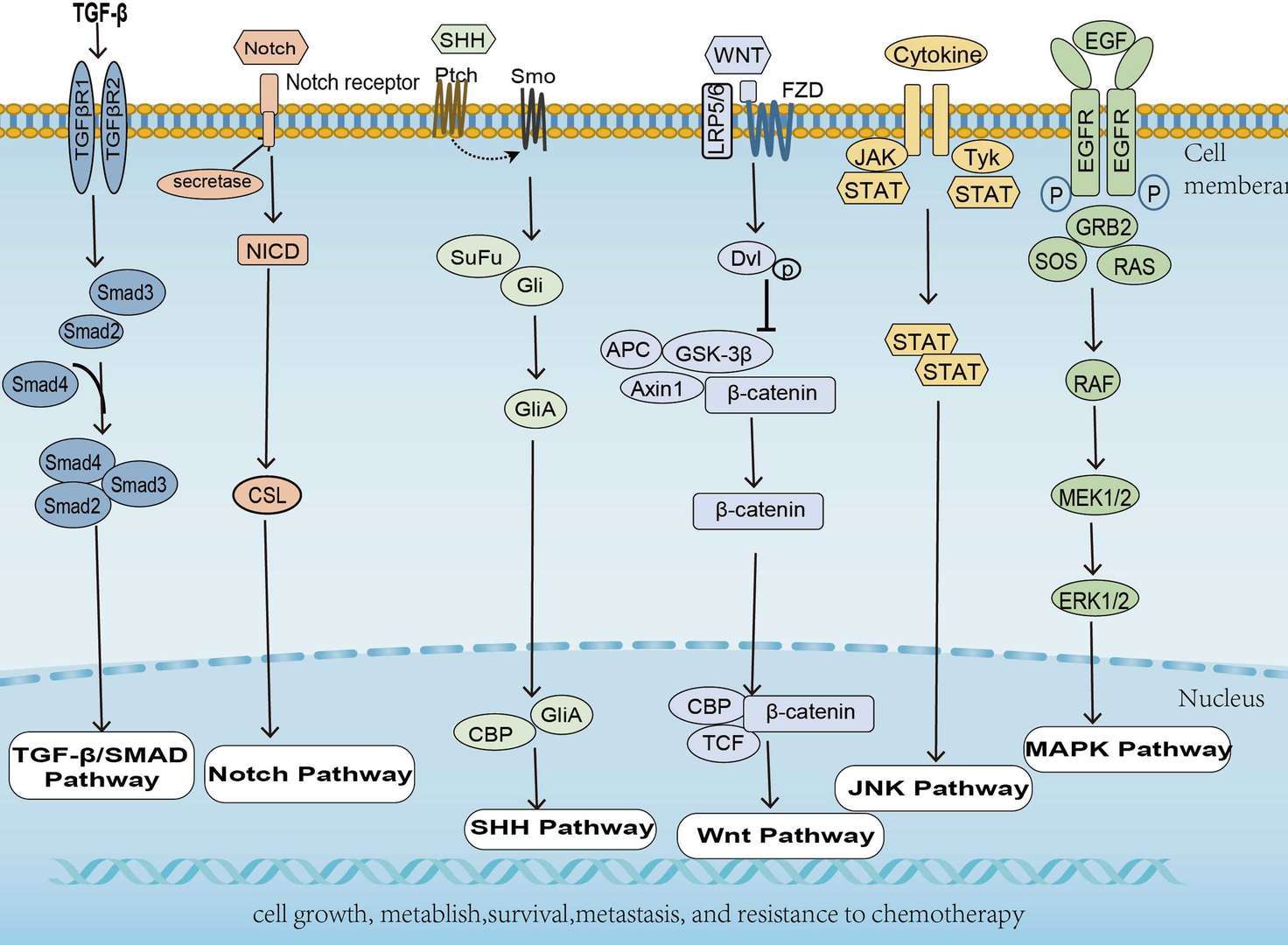 Pancreatic Cancer
Pancreatic Cancer
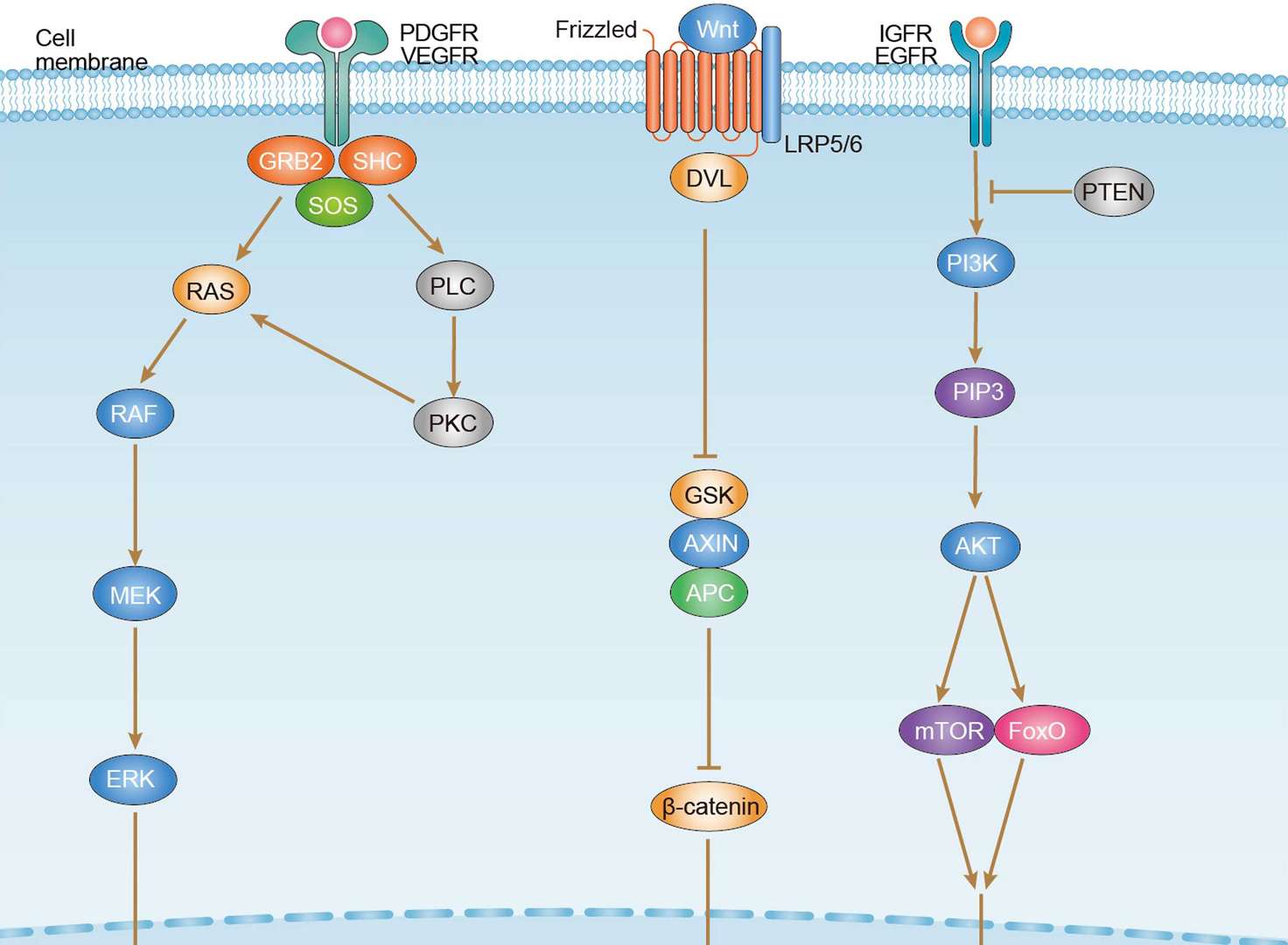 Hepatocellular Carcinoma
Hepatocellular Carcinoma
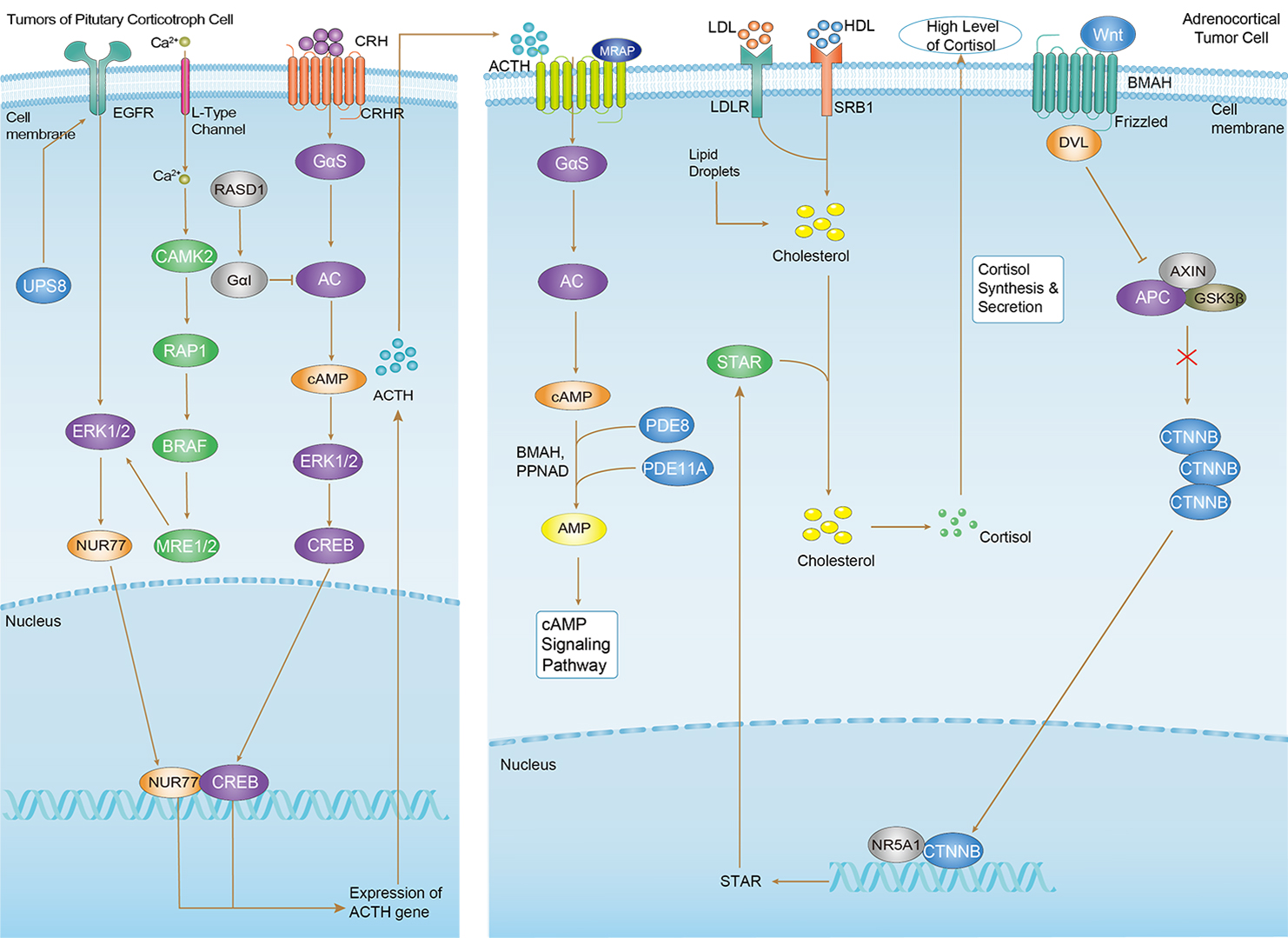 Cushing Syndrome
Cushing Syndrome
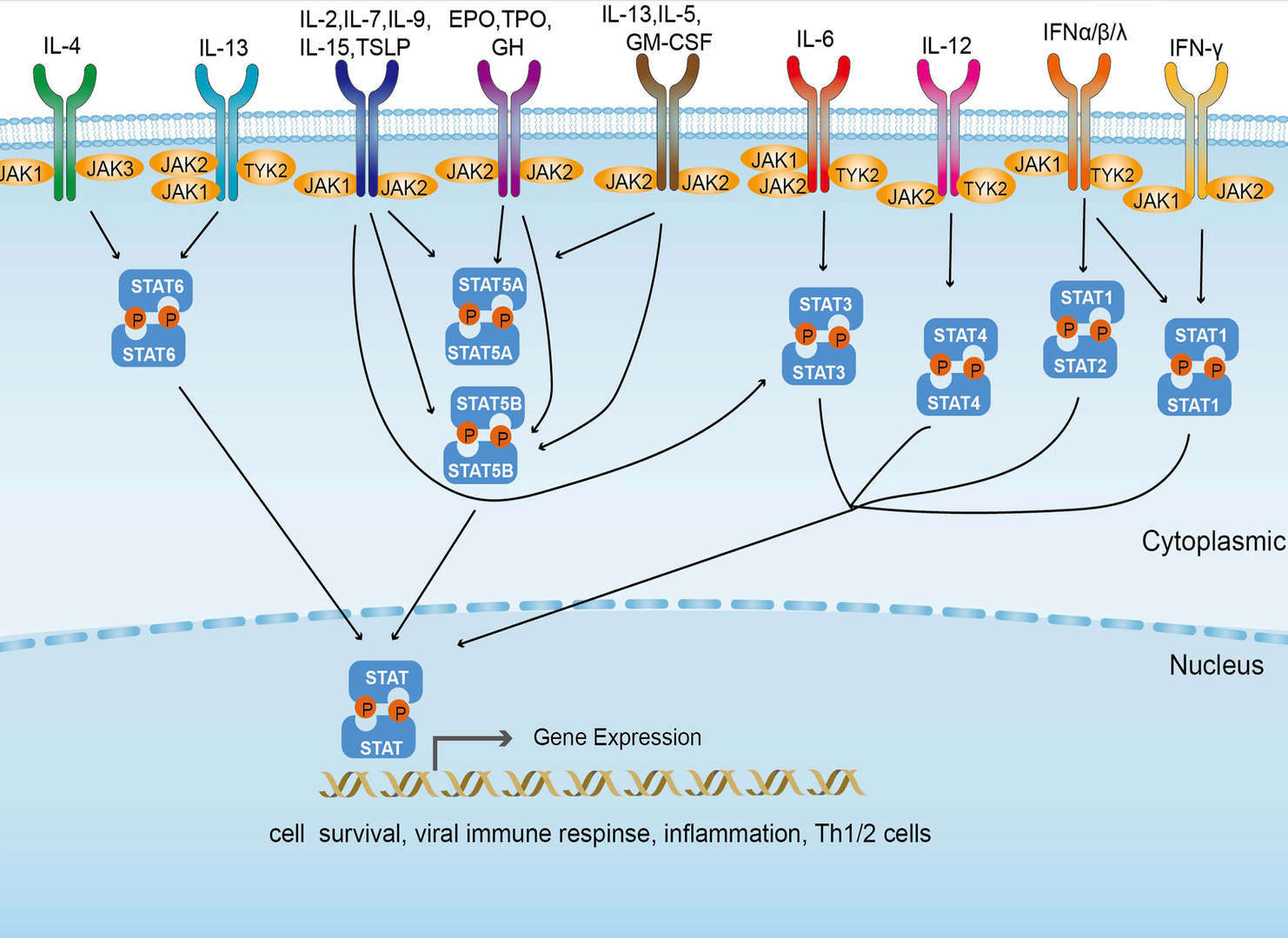 JAK-STAT Signaling Pathway
JAK-STAT Signaling Pathway